Unit8 Pets. Grammar 课件(共37张PPT)
文档属性
| 名称 | Unit8 Pets. Grammar 课件(共37张PPT) | 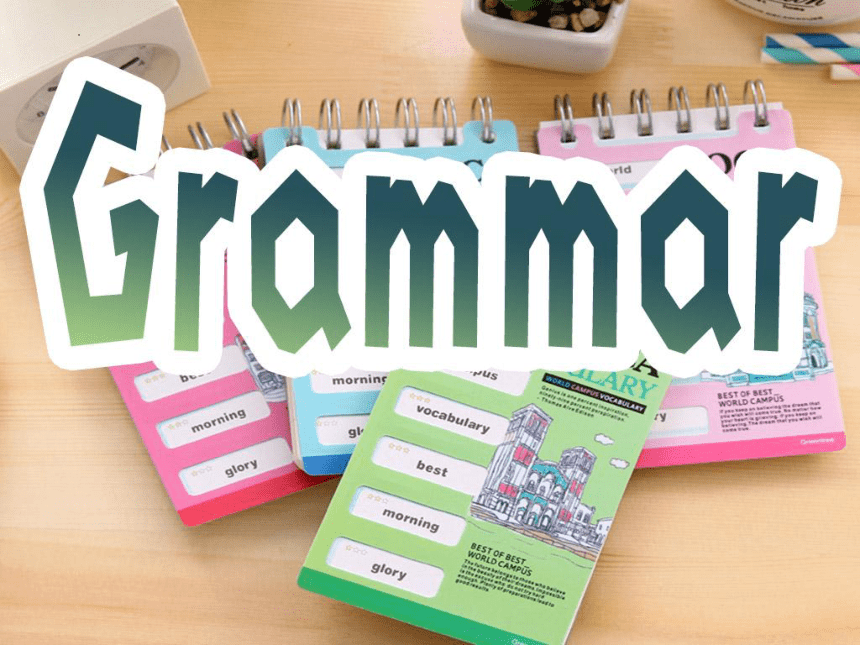 | |
| 格式 | zip | ||
| 文件大小 | 1.9MB | ||
| 资源类型 | 教案 | ||
| 版本资源 | 牛津译林版 | ||
| 科目 | 英语 | ||
| 更新时间 | 2022-05-29 18:44:49 | ||
图片预览

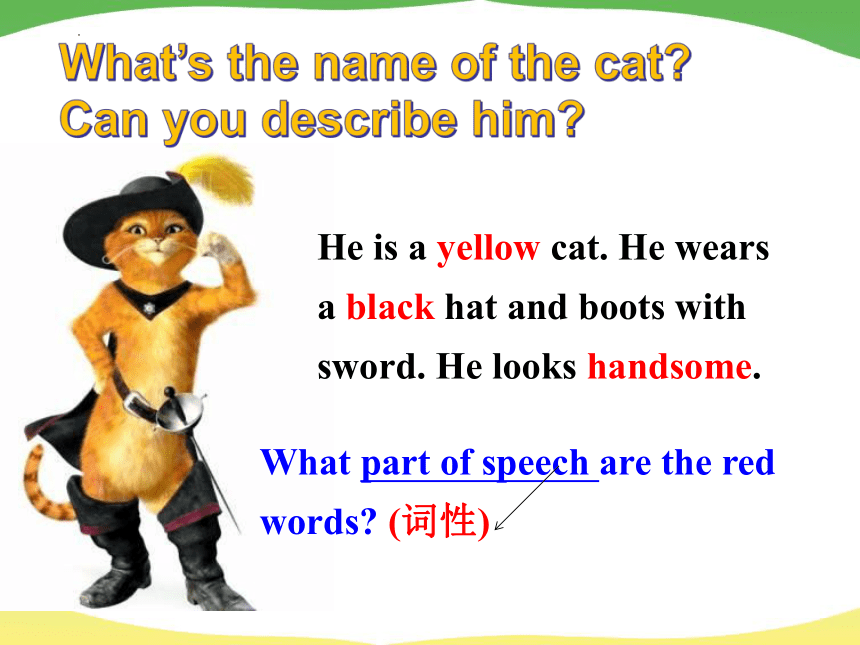
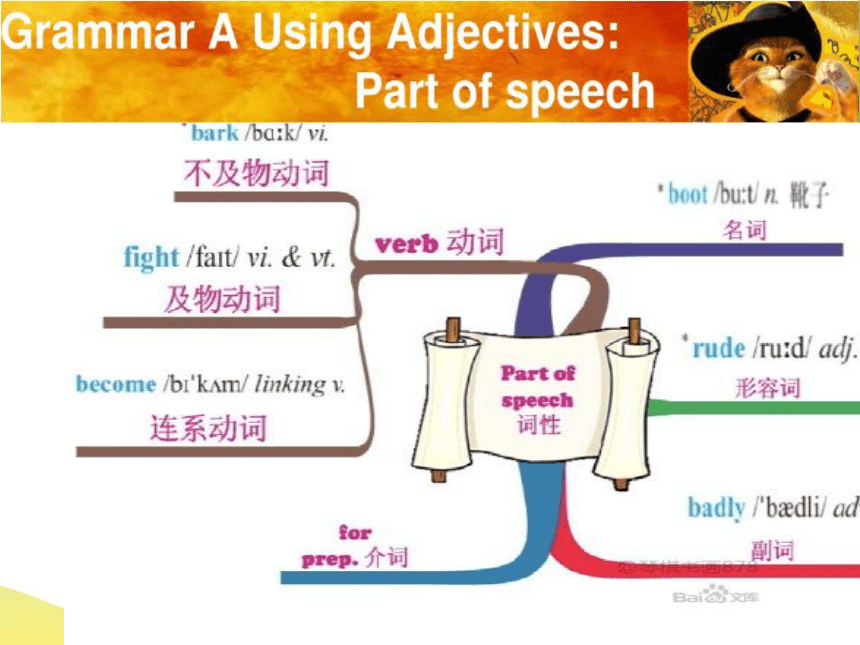
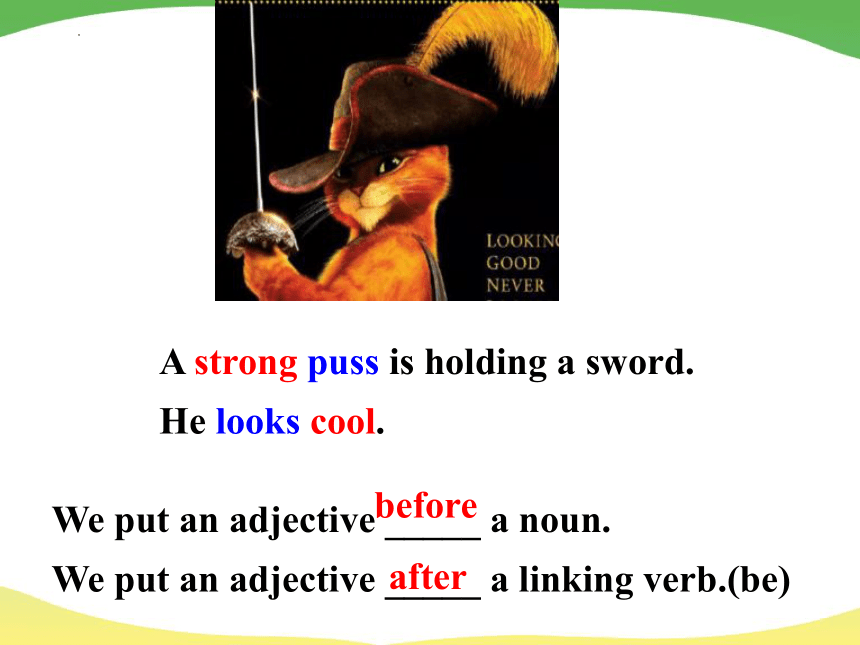
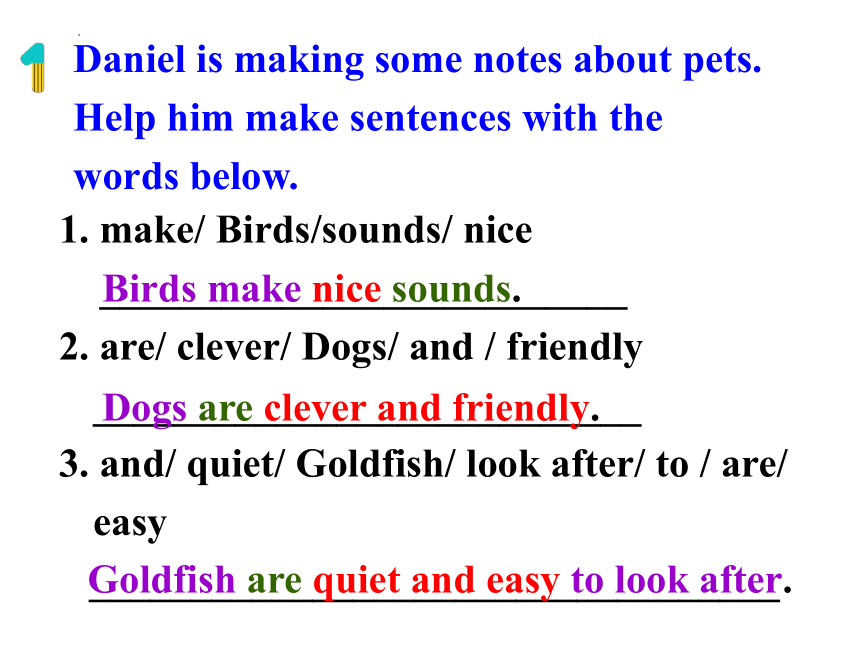
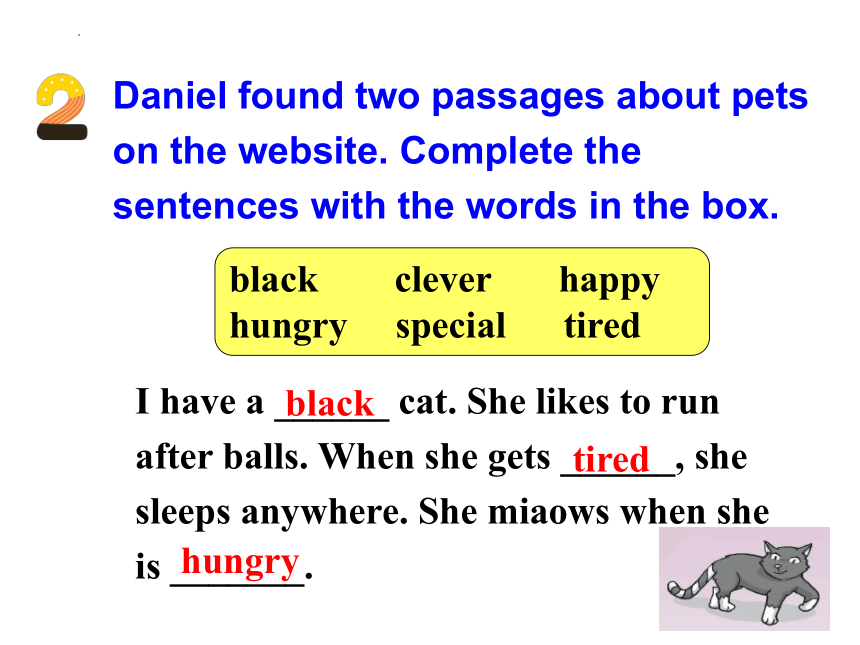
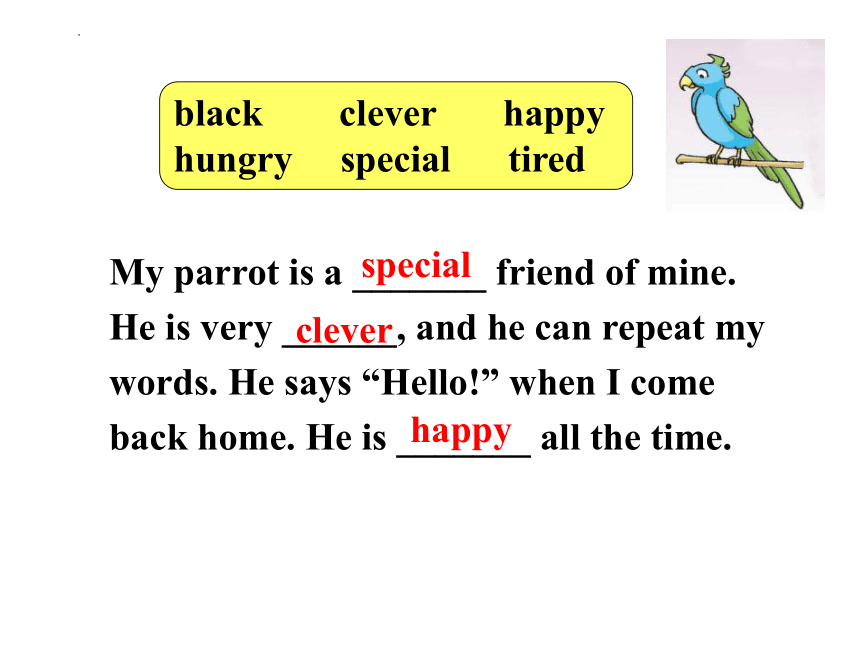

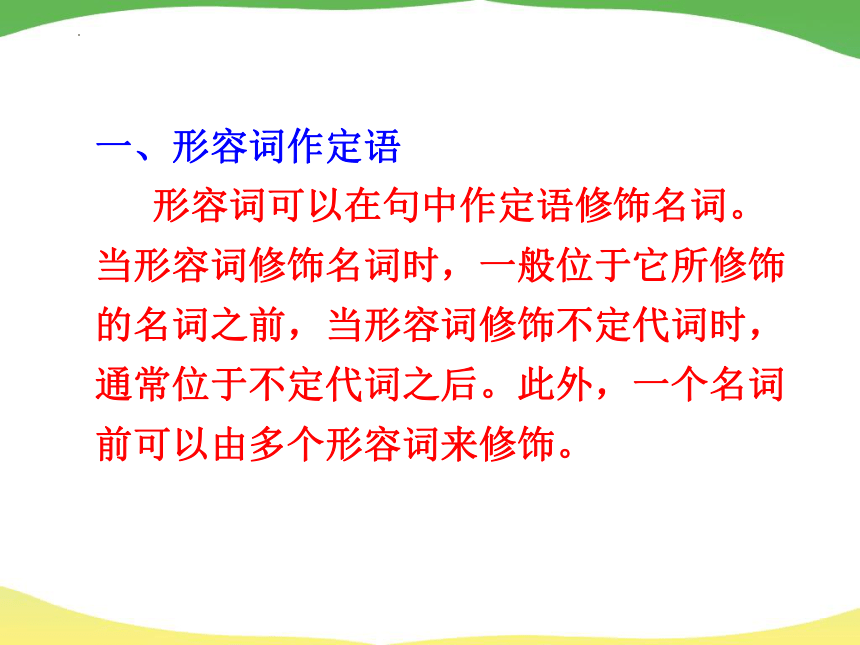
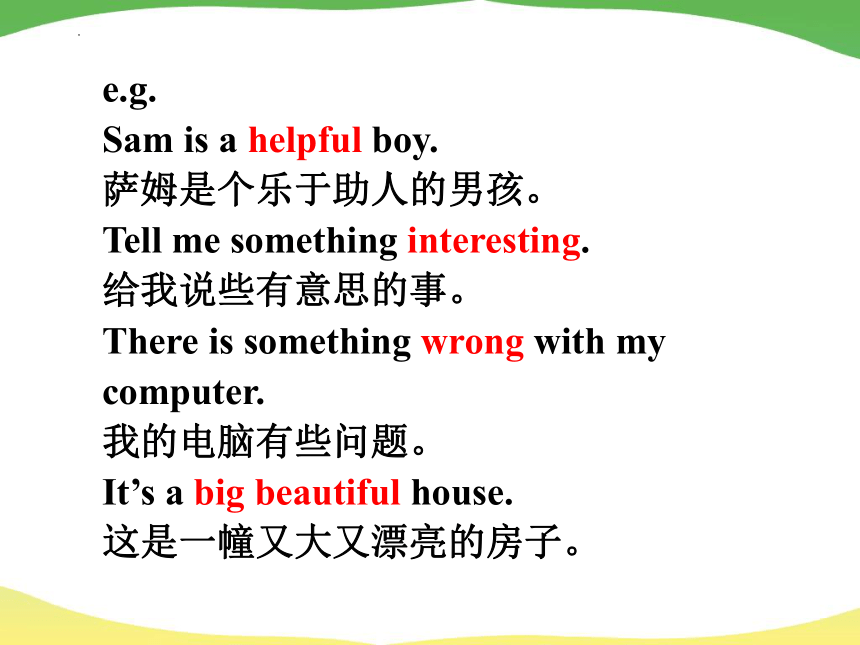
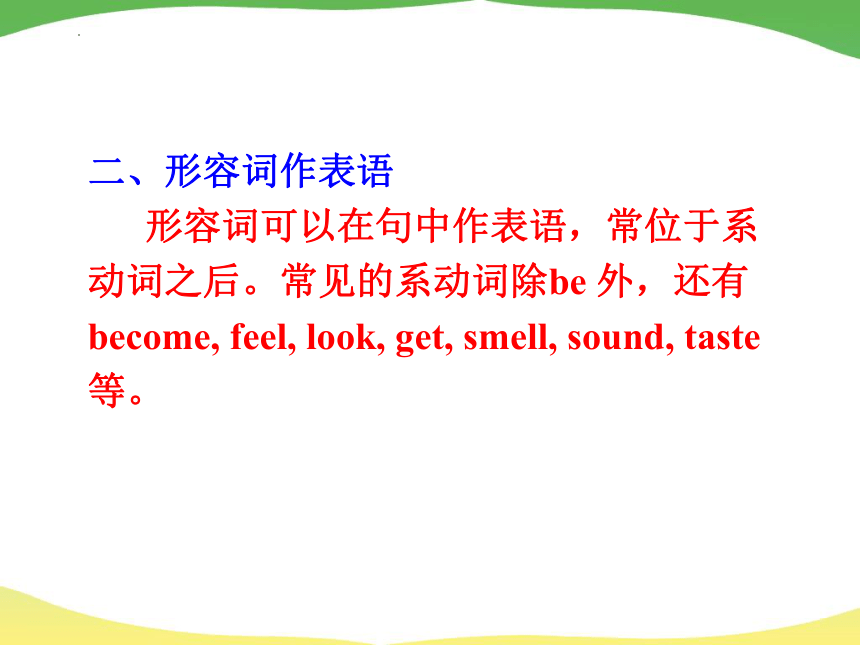
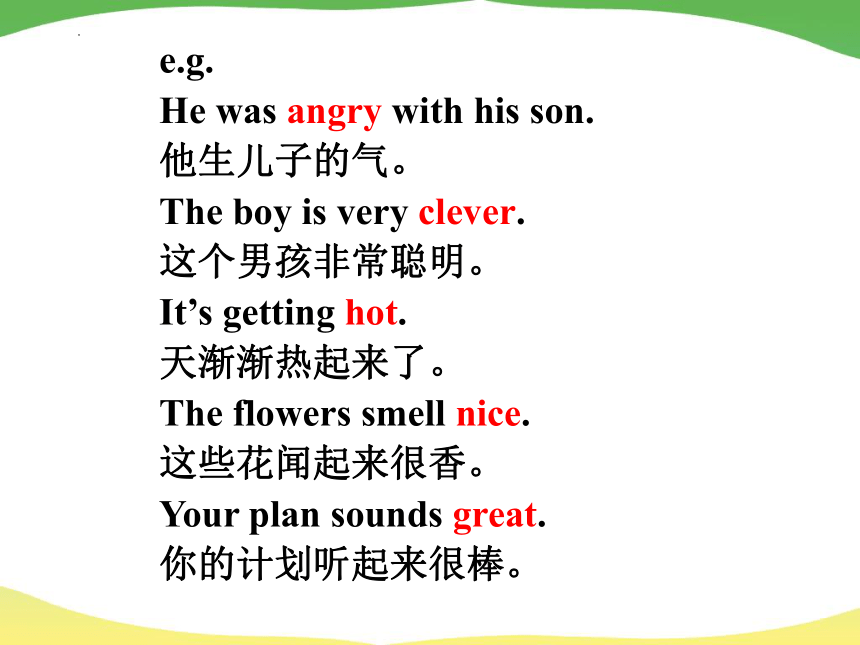
文档简介
(共37张PPT)
What’s the name of the cat Can you describe him
He is a yellow cat. He wears a black hat and boots with sword. He looks handsome.
What part of speech are the red words (词性)
A strong puss is holding a sword.
He looks cool.
We put an adjective _____ a noun.
We put an adjective _____ a linking verb.(be)
before
after
1. make/ Birds/sounds/ nice
__________________________
2. are/ clever/ Dogs/ and / friendly ___________________________
3. and/ quiet/ Goldfish/ look after/ to / are/ easy
__________________________________
Birds make nice sounds.
Dogs are clever and friendly.
Goldfish are quiet and easy to look after.
Daniel is making some notes about pets. Help him make sentences with the words below.
black clever happy
hungry special tired
Daniel found two passages about pets on the plete the sentences with the words in the box.
I have a ______ cat. She likes to run after balls. When she gets ______, she sleeps anywhere. She miaows when she is _______.
black
tired
hungry
My parrot is a _______ friend of mine. He is very ______, and he can repeat my words. He says “Hello!” when I come back home. He is _______ all the time.
special
clever
happy
black clever happy
hungry special tired
形容词的用法
形容词用于描述人或事物的属性、特征或状态。形容词在句子中的具体位置和用法是怎样的呢?
一、形容词作定语
形容词可以在句中作定语修饰名词。当形容词修饰名词时,一般位于它所修饰的名词之前,当形容词修饰不定代词时,通常位于不定代词之后。此外,一个名词前可以由多个形容词来修饰。
e.g.
Sam is a helpful boy.
萨姆是个乐于助人的男孩。
Tell me something interesting.
给我说些有意思的事。
There is something wrong with my computer.
我的电脑有些问题。
It’s a big beautiful house.
这是一幢又大又漂亮的房子。
二、形容词作表语
形容词可以在句中作表语,常位于系动词之后。常见的系动词除be 外,还有become, feel, look, get, smell, sound, taste 等。
e.g.
He was angry with his son.
他生儿子的气。
The boy is very clever.
这个男孩非常聪明。
It’s getting hot.
天渐渐热起来了。
The flowers smell nice.
这些花闻起来很香。
Your plan sounds great.
你的计划听起来很棒。
当我们不知道或没有必要说明所谈论的是谁或是什么事物时,我们就用不定代词来指代人或物。
We use indefinite pronouns to refer to people and things when we do not know or do not need to mention who or what we are talking about.
question
How to use indefinite pronouns
There is nobody/no one/nothing in the house.
I saw nothing in the fridge(冰箱).
We use nobody, no one and nothing to refer to “not anyone” and “not anything”.
Is everybody/everyone here today
Everything is ready.
We use everybody, everyone and everything to refer to “all people” and “all things”.
Will _______help me I’m in trouble.
2. Would you like ______to drink
Which is better:
someone
Anyone
something
anything
Note 3:表示建议、请求与委婉说法的疑问句中,或希望得到肯定答复的疑问句中,常用含有some 的不定代词、副词。
Notes:
Listen! _____is knocking at the door.
----What do you think of Kitty
-----She is my true friend. She never
tells my secrets to ______.
3. ----Helen, what did you talk with Bob
-----He asked me to tell him ______I knew.
4.------Is there ______I can help
------Everything is ready. Just sit and wait.
something
someone
anything
anyone
Mr Hu is asking the students about their plete their conversation with the correct indefinite pronouns.
Mr Wu: Millie, I know you have a dog. What do you feed him
Millie: We usually give him dog food.
Mr Wu: Do you feed him _________ else
Millie: Yes. Sometimes we give him some meat. He likes it.
Mr Wu: I see. Does ________________ have a cat
Amy: Yes, I have a cat. She’s nice to
____________________.
Mr Wu: Good. I know ___________________ has goldfish, right
anything
anyone / anybody
everybody / everyone
somebody / someone
Peter: Yes, I do. Goldfish are easy to look after.
Mr Wu: That’s true. Does _________________ have a snake
Kitty: No. ________________ wants a snake, I think.
Daniel: I don’t agree. There’s _______ wrong with keeping a snake if you like it.
nothing
anyone / anybody
Nobody / No one
不定代词的用法
不指明代替任何特定人或事物的代词叫不定代词。不定代词根据指代的对象不同可以分为两类:一类指人,一类指事物。指人的不定代词大多是由some / any / no / every 和body / one组合而成的,指事物的不定代词大多是由some /any / no / every 和thing 组合而成的。
1. 由some与one, body, thing 组合而成的复
合不定代词通常用于肯定句中。如果期望可以得到对方肯定的回答,someone, somebody, something 也可以用于疑问句中。
e.g.
There is somebody / someone in the office.
有人在办公室里。
There is something interesting in today’s
newspaper.
今天的报纸上有一些有意思的内容。
Would you like something to drink
你想喝点什么?
2. 由any与one, body, thing 组合而成的复合
不定代词通常用于否定句和疑问句中。
e.g.
I didn’t know anybody / anyone at the party.
聚会上我一个人也不认识。
My father looked at me and didn’t say anything.
我父亲看着我,什么也没有说。
Did you meet anybody on your way home
你昨天在回家的路上碰见什么人了吗?
3. no one, nobody, nothing 含有否定的意义。
e.g. Nobody / No one failed the exam.
没有人考试不及格。
There is nothing wrong with your watch.
你的手表没什么问题。
4. 由every与one, body, thing 组合而成的复
合不定代词可以用于各种句式中。
e.g. Everybody / Everyone came to school on time this morning.
今天早上,每个人都按时到校了。
Is everything ready now
一切都准备好了吗?
I. 从各题后所给的A、B、C、D四个选项中
选出最佳答案。
1. —Your cat looks really ______.
—Thanks. She is always a nice pet.
A. friendly B. happily
C. quietly D. carefully
A
2. —I don’t think Jim is ______ to get 100
points.
—Well, he can if he has good luck.
A. enough careful B. careful enough
C. enough carefully D. carefully enough
3. —Is ______ ready for the game now
—Yes. Let’s start!
A. someone B. anyone
C. no one D. everyone
B
D
4. —What a difficult question! But I think
______ can find out the answer.
—I think so, too. Maybe Jim can.
A. someone B. anyone
C. no one D. everyone
5. —Why didn’t you have breakfast this
morning
—I was just too busy to eat ______.
A. something B. anything
C. nothing D. everything
A
B
6. —Would you like ______ to drink today
—Thanks. Maybe I can try some lemon juice.
A. different something
B. different anything
C. something different
D. nothing different
C
II. 根据题后括号内的要求,改写下列句子,
每空一词(含缩略形式)。
1. The cake tastes too sweet. (对划线部分提
问)
________ ________ the cake taste
2. Our town is beautiful with many green
trees. (对划线部分提问)
________ ________ your town ________
How does
What is like
3. We met someone on our way here. (改为一
般疑问句)
________ you ________ ________ on your
way here
4. I found nothing unusual in the house. (改为
同义句)
I ________ ________ ________ unusual in
the house.
Did meet anyone
didn’t find anything
What’s the name of the cat Can you describe him
He is a yellow cat. He wears a black hat and boots with sword. He looks handsome.
What part of speech are the red words (词性)
A strong puss is holding a sword.
He looks cool.
We put an adjective _____ a noun.
We put an adjective _____ a linking verb.(be)
before
after
1. make/ Birds/sounds/ nice
__________________________
2. are/ clever/ Dogs/ and / friendly ___________________________
3. and/ quiet/ Goldfish/ look after/ to / are/ easy
__________________________________
Birds make nice sounds.
Dogs are clever and friendly.
Goldfish are quiet and easy to look after.
Daniel is making some notes about pets. Help him make sentences with the words below.
black clever happy
hungry special tired
Daniel found two passages about pets on the plete the sentences with the words in the box.
I have a ______ cat. She likes to run after balls. When she gets ______, she sleeps anywhere. She miaows when she is _______.
black
tired
hungry
My parrot is a _______ friend of mine. He is very ______, and he can repeat my words. He says “Hello!” when I come back home. He is _______ all the time.
special
clever
happy
black clever happy
hungry special tired
形容词的用法
形容词用于描述人或事物的属性、特征或状态。形容词在句子中的具体位置和用法是怎样的呢?
一、形容词作定语
形容词可以在句中作定语修饰名词。当形容词修饰名词时,一般位于它所修饰的名词之前,当形容词修饰不定代词时,通常位于不定代词之后。此外,一个名词前可以由多个形容词来修饰。
e.g.
Sam is a helpful boy.
萨姆是个乐于助人的男孩。
Tell me something interesting.
给我说些有意思的事。
There is something wrong with my computer.
我的电脑有些问题。
It’s a big beautiful house.
这是一幢又大又漂亮的房子。
二、形容词作表语
形容词可以在句中作表语,常位于系动词之后。常见的系动词除be 外,还有become, feel, look, get, smell, sound, taste 等。
e.g.
He was angry with his son.
他生儿子的气。
The boy is very clever.
这个男孩非常聪明。
It’s getting hot.
天渐渐热起来了。
The flowers smell nice.
这些花闻起来很香。
Your plan sounds great.
你的计划听起来很棒。
当我们不知道或没有必要说明所谈论的是谁或是什么事物时,我们就用不定代词来指代人或物。
We use indefinite pronouns to refer to people and things when we do not know or do not need to mention who or what we are talking about.
question
How to use indefinite pronouns
There is nobody/no one/nothing in the house.
I saw nothing in the fridge(冰箱).
We use nobody, no one and nothing to refer to “not anyone” and “not anything”.
Is everybody/everyone here today
Everything is ready.
We use everybody, everyone and everything to refer to “all people” and “all things”.
Will _______help me I’m in trouble.
2. Would you like ______to drink
Which is better:
someone
Anyone
something
anything
Note 3:表示建议、请求与委婉说法的疑问句中,或希望得到肯定答复的疑问句中,常用含有some 的不定代词、副词。
Notes:
Listen! _____is knocking at the door.
----What do you think of Kitty
-----She is my true friend. She never
tells my secrets to ______.
3. ----Helen, what did you talk with Bob
-----He asked me to tell him ______I knew.
4.------Is there ______I can help
------Everything is ready. Just sit and wait.
something
someone
anything
anyone
Mr Hu is asking the students about their plete their conversation with the correct indefinite pronouns.
Mr Wu: Millie, I know you have a dog. What do you feed him
Millie: We usually give him dog food.
Mr Wu: Do you feed him _________ else
Millie: Yes. Sometimes we give him some meat. He likes it.
Mr Wu: I see. Does ________________ have a cat
Amy: Yes, I have a cat. She’s nice to
____________________.
Mr Wu: Good. I know ___________________ has goldfish, right
anything
anyone / anybody
everybody / everyone
somebody / someone
Peter: Yes, I do. Goldfish are easy to look after.
Mr Wu: That’s true. Does _________________ have a snake
Kitty: No. ________________ wants a snake, I think.
Daniel: I don’t agree. There’s _______ wrong with keeping a snake if you like it.
nothing
anyone / anybody
Nobody / No one
不定代词的用法
不指明代替任何特定人或事物的代词叫不定代词。不定代词根据指代的对象不同可以分为两类:一类指人,一类指事物。指人的不定代词大多是由some / any / no / every 和body / one组合而成的,指事物的不定代词大多是由some /any / no / every 和thing 组合而成的。
1. 由some与one, body, thing 组合而成的复
合不定代词通常用于肯定句中。如果期望可以得到对方肯定的回答,someone, somebody, something 也可以用于疑问句中。
e.g.
There is somebody / someone in the office.
有人在办公室里。
There is something interesting in today’s
newspaper.
今天的报纸上有一些有意思的内容。
Would you like something to drink
你想喝点什么?
2. 由any与one, body, thing 组合而成的复合
不定代词通常用于否定句和疑问句中。
e.g.
I didn’t know anybody / anyone at the party.
聚会上我一个人也不认识。
My father looked at me and didn’t say anything.
我父亲看着我,什么也没有说。
Did you meet anybody on your way home
你昨天在回家的路上碰见什么人了吗?
3. no one, nobody, nothing 含有否定的意义。
e.g. Nobody / No one failed the exam.
没有人考试不及格。
There is nothing wrong with your watch.
你的手表没什么问题。
4. 由every与one, body, thing 组合而成的复
合不定代词可以用于各种句式中。
e.g. Everybody / Everyone came to school on time this morning.
今天早上,每个人都按时到校了。
Is everything ready now
一切都准备好了吗?
I. 从各题后所给的A、B、C、D四个选项中
选出最佳答案。
1. —Your cat looks really ______.
—Thanks. She is always a nice pet.
A. friendly B. happily
C. quietly D. carefully
A
2. —I don’t think Jim is ______ to get 100
points.
—Well, he can if he has good luck.
A. enough careful B. careful enough
C. enough carefully D. carefully enough
3. —Is ______ ready for the game now
—Yes. Let’s start!
A. someone B. anyone
C. no one D. everyone
B
D
4. —What a difficult question! But I think
______ can find out the answer.
—I think so, too. Maybe Jim can.
A. someone B. anyone
C. no one D. everyone
5. —Why didn’t you have breakfast this
morning
—I was just too busy to eat ______.
A. something B. anything
C. nothing D. everything
A
B
6. —Would you like ______ to drink today
—Thanks. Maybe I can try some lemon juice.
A. different something
B. different anything
C. something different
D. nothing different
C
II. 根据题后括号内的要求,改写下列句子,
每空一词(含缩略形式)。
1. The cake tastes too sweet. (对划线部分提
问)
________ ________ the cake taste
2. Our town is beautiful with many green
trees. (对划线部分提问)
________ ________ your town ________
How does
What is like
3. We met someone on our way here. (改为一
般疑问句)
________ you ________ ________ on your
way here
4. I found nothing unusual in the house. (改为
同义句)
I ________ ________ ________ unusual in
the house.
Did meet anyone
didn’t find anything
